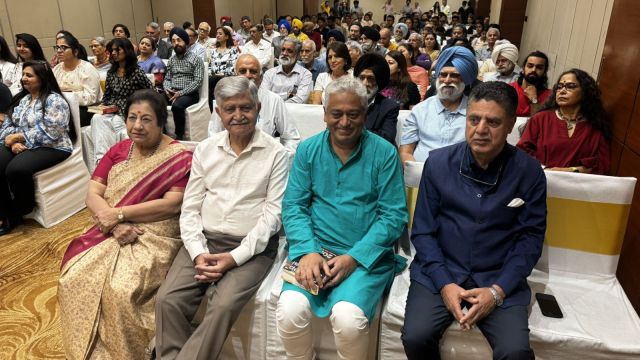Discussion on how 2024 election ‘surprised India’ becomes weekend’s musing for Chandigarh
The discussion also touched on the inspiring stories that emerged from the elections.
 Rajdeep Sardesai discusses his book on the 2024 elections, exploring the surprise outcomes and evolving dynamics of Indian democracy. (Photo: X/@sardesairajdeep)
Rajdeep Sardesai discusses his book on the 2024 elections, exploring the surprise outcomes and evolving dynamics of Indian democracy. (Photo: X/@sardesairajdeep)“The Indian voter in 2024 mirrored what India is, or was meant to be: a land of incredible diversity where the idea of ‘One Nation, One Leader, One Religion’ was always going to be challenged,” said senior journalist Rajdeep Sardesai while speaking on his latest book, ‘2024: The Election That Surprised India’, in Chandigarh on Saturday evening. Organised by Bahrisons Booksellers and Novel Bunch, the event at the Hyatt Regency drew an engaged audience eager to dissect the dynamics of India’s most recent general election.
Sardesai delved into the highly competitive nature of the 2024 elections, describing it as a state-by-state contest driven largely by local anti-incumbency. From onion farmers in Maharashtra angered by export restrictions to Maratha reservations dominating discourse in Marathwada, he illustrated how regional issues dictated voter behaviour. “It wasn’t a national sweep; it was a state-level, seat-by-seat battle where the hawa (wind) changed in major battlegrounds,” he observed.
Reflecting on the electoral narrative, he pointed out how Prime Minister Narendra Modi’s historic third-term victory was paradoxically seen as a setback. “The ‘ab ki baar 400 paar’ campaign had set expectations so high that despite winning 240 seats, the BJP appeared to have lost. Meanwhile, the Congress, with 99 seats, celebrated as if it had won,” he quipped.
Sardesai recounted how media assumptions were upended during the election. He shared an anecdote from Ayodhya, where, fresh from witnessing Modi’s grand roadshow, he was taken aback by an auto-rickshaw driver’s remark: “Ab ki baar na Mathura, na Kashi, abki baar Awadhesh Pasi.” The name was unfamiliar to him, revealing how even seasoned journalists often miss the nuances of caste and local politics. “Our primary focus was on the Ram temple’s impact on voters, but on the ground, it was about land deals, displacement, and economic disparity,” he said. True to the rickshaw driver’s words, Samajwadi Party’s Awadhesh Prasad triumphed in Faizabad, proving that caste equations and local concerns outweigh religious consolidation.
Sardesai emphasised the BJP’s relentless election machinery, contrasted it with the Congress’s passive approach. “You can’t win an election by just waving a hand,” he remarked, citing how the BJP fought till the last moment to retain Haryana assembly and how a viral WhatsApp message in Maharashtra falsely claiming that the Siddhivinayak temple was being taken over by the Waqf Board swayed voter sentiment. The senior journalist also pointed to the farm agitation as an example of political miscalculation, where the Modi government’s rollback of contentious laws underscored its vulnerability and flexibility in the face of resistance.
When asked whether the loyal Indian voter who had brought the Congress to power for 60 years would do the same for the BJP, Sardesai said the BJP was here to stay, at least for the next 20 years. However, he was quick to add that in a country as diverse and vibrant as India, nothing could ever be predicted with certainty.
The discussion also touched on the inspiring stories that emerged from the elections. “Where but in India could a 26-year-old Dalit mother defeat an entire party machine or a young Muslim woman leave academia to successfully win votes across communities or a tribal leader mobilise a volunteer force through crowdfunding” he asked, highlighting the resilience of grassroots politics.
During the question and answer (Q&A) session, an audience member asked about the credibility of electronic voting machines (EVMs). Sardesai dismissed doubts, stating, “Why are there no questions on EVMs when the Congress wins. Show me the proof. I’ve seen the era of ballot boxes being snatched and papers being torn.” On political influence over sports, he acknowledged it as an age-old phenomenon, recalling how the Indian cricket team once altered its travel plans to meet then prime minister Indira Gandhi. However, he expressed optimism about India’s sporting future. “Today, talent is emerging from every corner of the country, and platforms like the IPL are giving small-town players a chance to shine,” he said.
As the evening drew to a close and people queued up for selfies with Sardesai, it was clear that the veteran journalist’s insights had left the audience with much to ponder — not just about the 2024 elections, but about the evolving landscape of Indian democracy itself.







